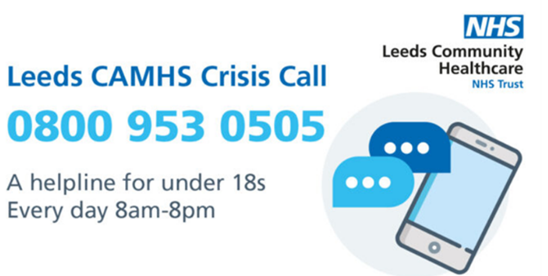If you are worried about your mental health or that of your child, the NHS in Leeds operates a Freephone helpline for under 18s between 8am and 8pm every day. They offer young people and their families or carers advice, support, someone to listen, or signposting as appropriate, regardless of the circumstance.

Sarah Dumont
Senior Deputy Principal
Designated Safeguarding Lead

Joanna Summers
Safeguarding Manager
Deputy Safeguarding Lead

Deborah O'Connor
Safeguarding Supervisor
Deputy Safeguarding Lead

Amelia Birkin
Safeguarding Officer

Gareth Lloyd
Safeguarding Officer

Neil Johnson
Mental Health Support Officer
If something is troubling you or someone you know at college, there are lots of people that can help:
Your Achievement Tutor
Your Achievement Tutor is the first person to go to if you are having problems. They are the people who know you best, and this helps them arrange the best support for you. You formally meet your Achievement Tutor every week but you can access an Achievement Tutor by visiting the Student Reception in St Elizabeth at any point you need support.
Safeguarding Team
Safeguarding Officers can help you if you are being harmed by someone (in or out of college) or are at risk of being harmed. The Safeguarding Office is located in the Main Building in room MB23 and MB24 opposite the Lower Study Area. You can also email safeguardingteam@ndonline.ac.uk or call Joanna Summers, Safeguarding Manager, on 01132021339 for out of office emergencies.
REMEMBER...
You can also go to any of your subject teachers or to any other member of staff in school.
DON'T KEEP QUIET IF YOU ARE STRUGGLING - LET SOMEONE KNOW
Notre Dame Catholic Sixth Form College is fully committed to safeguarding and promoting the wellbeing of all students, staff and visitors. Having a safe environment is so important so our students can devote their efforts to being successful in their studies, developing their character and planning for their futures.
All staff are carefully selected using recruitment and selection procedures designed to emphasise our commitment to safeguarding. All posts, including volunteers, are subject to enhanced Disclosure and Barring Service (DBS) clearance. We ensure that all staff receive appropriate safeguarding training and are aware of their responsibilities if a student discloses, or is suspected to be suffering from, any form of abuse or harm.
Safeguarding and protecting the welfare young people involves:
- protecting them from maltreatment, abuse and/or neglect;
- preventing impairment of mental or physical health;
- taking action to enable all young people to have the best outcomes.
This can include a person being affected by:
- bullying/harassment/other peer-on-peer abuse
- abuse at home or college
- online safety
- mental health
- substance misuse
- exploitation (sexual or criminal)
- risk of radicalisation (being drawn into extremism or terrorism)
- homelessness
- Youth violence
Please talk with your Achievement Tutor or any member of staff if you have any concerns about your safety/wellbeing or the safety/wellbeing of others.
If you are a parent/carer or member of the public and you are concerned about a student, please call the main college switchboard on 0113 2946644 and ask to speak to a member of the safeguarding team.
You can also contact a member of the safeguarding team by emailing: ReportingConcerns@notredamecoll.ac.uk.
If you feel at immediate risk, contact the Police on 999
- For non-emergency concerns or for Police advice, call 101.
- There’s lots of advice about a wide range of safety and wellbeing concerns on https://www.westyorkshire.police.uk/advice
- West Yorkshire Police also have an online service to contact them in non-emergency situations https://www.westyorkshire.police.uk/report-it
Notre Dame is officially recognised as Young Carer Friendly. If you are a young carer, please make yourself known to our Safeguarding Officer and Designated Young Carer Lead, Gareth Lloyd, by emailing g.lloyd@notredamecoll.ac.uk calling 0113 294 6644 EXT: 119 or by visiting the Safeguarding Office (MB23) You can also access support from Leeds Young Carers Support Service.
A Young Carer is someone under 18 or is 18 years but still at school, who provides unpaid help and support to a relative, friend or neighbour who due to illness or disability cannot manage to live independently without their help. Please click the links below to check out more resources:
SUPPORT FOR YOUNG CARERS AND FAMILIES
ALTERNATE CARER SUPPORT
Childline is here to help anyone under 19 in the UK with any issue they’re going through. You can talk about anything. Whether it’s something big or small, our trained counsellors are here to support you. Childline is free, confidential, and available any time, day or night. You can have a 1-2-1 counsellor chat by clicking here or you can call 0800 1111
The Samaritans are available 24 hours a day, 365 days a year. You can contact them by phone on 116 123 or via email on jo@samaritans.org. Common reasons people contact the Samaritans are:
- relationship and family problems
- loss, including loss of a friend or a family member through bereavement
- financial worries
- feeling stressed or anxious
- college or study-related stress
- loneliness and isolation
- depression
- painful and/or disabling physical illness
- heavy use of or dependency on alcohol or other drugs
- thoughts of suicide
West Yorkshire Night OWLS is a confidential support line for children, young people, their parents and carers who live in Bradford, Leeds, Calderdale, Kirklees and Wakefield. This is a pilot scheme funded till March 2022.
If a child or young person you care for is in a crisis and you are concerned about their emotional wellbeing contact Night OWLs
Night OWLS can help you if you:
- Feel you have nowhere to turn
- Feel you can’t go on living
- Are in a crisis
- Are finding it hard to cope with life
- Are feeling angry, lonely, anxious or depressed
- Are feeling confused or finding it hard to think straight
- Are feeling unsafe
- Are caring for a young person
- Just want to talk
We’re available 8pm–8am every day for children, young people, parents, and carers across West Yorkshire.
Call this number for free: 0300 2003900 or text us on: 07984 392700
What is Prevent?
- Prevent is a Government strategy that was set up as part of a wider counter-terrorism strategy called Contest.
- The aim of Prevent is to stop the radicalisation of young people across the UK in order to prevent extremism and terrorism
- All schools and colleges have a duty to teach young people about extremism and radicalisation
How can I protect myself?
- Be open to discussing and debating political topics with others
- Get your information from the experts rather than online
- Speak to someone if something doesn’t quite feel right
- Challenge hate and promote love
We ALL have a responsibility to challenge HATE CRIMES so that people are dealt with before this hate becomes radical.
You can access more Prevent information below:
Safer Devon: Online Radicalisation
Spread love, not hate.
Students who are hungry can go to their Achievement Tutor (St Elizabeth Student Reception) or Safeguarding Offices (MB23 - Main Building).
You can also find a food bank near you in Leeds by clicking here: https://leedsfoodaidnetwork.co.uk/food-banks/
As children get older and more independent, issues that affect them can be harder to spot and deal with. Learning about potential dangers can give you the knowledge and skills to act if there is a problem. It could also help keep your child safe by preventing problems before they happen. You know your child best, so if you’ve got a feeling something’s up – you’re right not to ignore it. You can access ParentWise below, which contains a range of advice and tips to support you:


 Website By Rejuvenate Digital
Website By Rejuvenate Digital